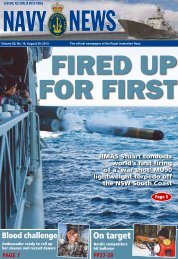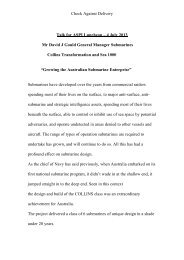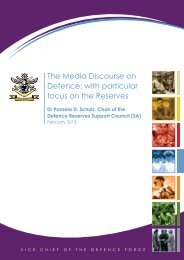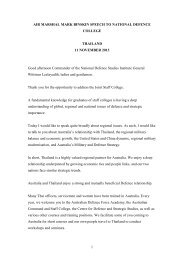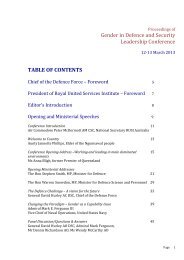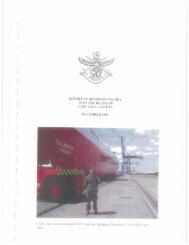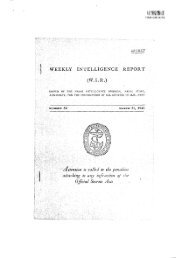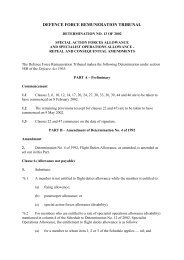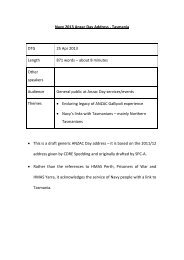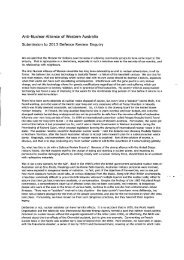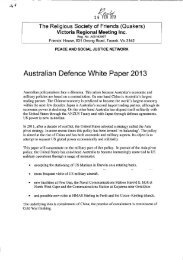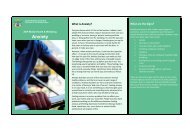right royal visit p2 7 bde's grand send - Department of Defence
right royal visit p2 7 bde's grand send - Department of Defence
right royal visit p2 7 bde's grand send - Department of Defence
You also want an ePaper? Increase the reach of your titles
YUMPU automatically turns print PDFs into web optimized ePapers that Google loves.
Army February 4, 2010<br />
ENQUIRIES: dsco.contact@defence.gov.au<br />
LIFESTYLE 37<br />
HEALTH<br />
Getting going in 2010<br />
You really pigged out over the break! Now it’s<br />
a mad scramble to get fit but, according to Lt<br />
Rob Orr, the best thing you can do is take it<br />
one step at a time and slow down.<br />
WHETHER a seasoned athlete,<br />
an occasional fitness<br />
participant, or a beginner<br />
with a New Year’s resolution<br />
to get fit, many members will<br />
return to work and vigorously engage<br />
in a fitness regime.<br />
One <strong>of</strong> the key causes <strong>of</strong> injury<br />
when returning to training and sport,<br />
as well as being a major motivation<br />
buster, is the “bull at a gate” syndrome.<br />
Members feeling refreshed from<br />
eave or under pressure to pass a fitness<br />
assessment, decide to take the<br />
plunge and get stuck into their fitness<br />
routines.<br />
Training diligently every day for<br />
n hour, many push hard to reach their<br />
oals.<br />
Unfortunately, this approach <strong>of</strong>ten<br />
eads to failure as the body and mind<br />
ire rapidly. For some, motivation is<br />
ost, while for others who push through<br />
mental warning barriers, overtraining<br />
and injury await.<br />
The key step in avoiding these pitfalls<br />
and ensuring a successful return<br />
to physical training is knowledge, and<br />
with this in mind this article will look<br />
at the impact <strong>of</strong> leave on the body and<br />
how to begin/start again with physical<br />
raining.<br />
Fact 1: Detraining<br />
As physical activity is reduced over<br />
the festive season, physical fitness<br />
declines. Some research has shown<br />
that as much as 1 per cent <strong>of</strong> VO2, a<br />
measure <strong>of</strong> aerobic fitness, is lost each<br />
day following inactivity.<br />
In performance measures, this<br />
equates to an increase in a 2.4km<br />
run time <strong>of</strong> around one minute or a<br />
decrease in shuttle run ability <strong>of</strong> seven<br />
levels per week <strong>of</strong> inactivity.<br />
When it comes to strength, although<br />
the loss is not as drastic, muscle<br />
strength is also lost due to inactivity.<br />
Fact 2: Weight increase<br />
Often over the leave period, the<br />
reduction in physical activity combines<br />
with an increase in food and alcohol<br />
consumption. The outcome <strong>of</strong> this<br />
equation, <strong>of</strong> calories out versus calories<br />
in, is an increase in body weight.<br />
This increase in weight reduces the<br />
aerobic fitness <strong>of</strong> the body, reduces<br />
the body’s relative strength, and, most<br />
importantly, increases the weight your<br />
body must now carry.<br />
The two combine to have a notable<br />
impact on fitness and injury potential<br />
as a now less-fit body must carry additional<br />
weight.<br />
For those who were very active<br />
Too much too soon: Beware <strong>of</strong> over training. Photo by AB Paul Berry<br />
before going on leave, this effect on<br />
fitness is an important consideration.<br />
Often members expect to be able to<br />
perform at the same level <strong>of</strong> fitness on<br />
return to activity.<br />
They expect to be able to run at<br />
the same pace or for the same length<br />
<strong>of</strong> time, do as many push ups or lift as<br />
much weight.<br />
Many simply continue with their<br />
training program as if they had never<br />
taken a break.<br />
For those few able to exercise at<br />
the same pace and volume, the cost <strong>of</strong><br />
performing at this same level is higher<br />
than it was pre-leave and soon the<br />
body fatigues or an injury occurs.<br />
Those who fail to start training at<br />
the same level will lose motivation and<br />
in all probability cease training.<br />
Conversely some members will<br />
attack their training with even more<br />
vigour in an attempt to rapidly return<br />
to pre-leave fitness levels.<br />
Again, the outcome <strong>of</strong> this approach<br />
can <strong>of</strong>ten be fatigue and/or injury.<br />
BEGINNING<br />
MADE EASIER<br />
For the first four weeks a<br />
steady progressive approach<br />
to training is recommended:<br />
➤ For the first two weeks<br />
train no more than three to<br />
four times a week. Then, if<br />
comfortable with frequency,<br />
increase to no more<br />
than five times a week.<br />
➤ Train at a low intensity – no<br />
more than 80 per cent <strong>of</strong><br />
maximum effort.<br />
➤ Train for no more than 40<br />
minutes (excluding warm<br />
up and cool down).<br />
➤ Try as many different activities<br />
as possible. Rotate<br />
through different weighttraining<br />
exercises, try<br />
different cardio machines,<br />
run different routes.<br />
For those beginning with a new<br />
training program, a similar trap exists<br />
where they suddenly begin their exercise<br />
program with overenthusiastic<br />
high-volume training every day .<br />
Regrettably, the progressive<br />
increase in body stress begins to overwhelm<br />
the initial enthusiasm.<br />
Waking every morning with muscle<br />
soreness and fatigue leads to a loss <strong>of</strong><br />
motivation and soon one day <strong>of</strong> training<br />
is missed, then two, then a week<br />
and soon training is forgotten.<br />
AUSTRALIAN DEFENCE SPACE SEMINAR 2010<br />
23-24 March 2010 | BAE Systems Theatre, Australian War Memorial, Canberra<br />
DPSDEC014/09



